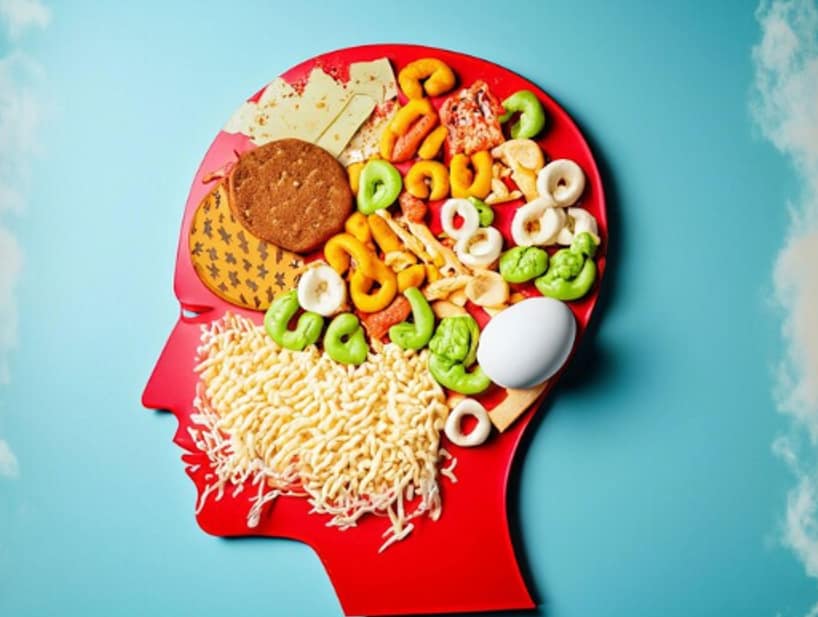How Sugar and Processed Foods Impact OCD and Anxiety

How Sugar and Processed Foods Influence OCD and Anxiety Levels
In today’s fast-paced society, mental health problems—in particular, anxiety disorders and obsessive-compulsive disorder (OCD)—have become more prevalent. Although environmental, emotional, and hereditary factors are frequently cited as key contributors to these diseases, new research shows that there is rising worry about the effects of nutrition, especially the consumption of processed foods and sugar, on mental health. In-depth discussions of the underlying mechanisms, the importance of nutrition for mental health, and doable strategies for controlling OCD and anxiety through dietary decisions are provided in this article.
Understanding OCD and Anxiety
Understanding the nature of OCD and anxiety disorders is essential before delving into the nutritional elements.
Obsessive-Compulsive Disorder (OCD)- The chronic mental illness known as obsessive-compulsive disorder (OCD) is typified by intrusive, unwanted thoughts (called obsessions) and repetitive actions (called compulsions) meant to lessen the misery these thoughts cause. In reaction to their obsessions, people with OCD may develop compulsions such as excessive handwashing, checking, or counting, which can have a major negative influence on their quality of life.
Anxiety disorders -Panic disorder, social anxiety disorder, and generalized anxiety disorder (GAD) are among the ailments that fall under the umbrella of anxiety disorders. Anxiety disorders are characterized by excessive, ongoing concern or fear that interferes with day-to-day functioning.
According to the team of Top OCD Doctors in Mumbai Neurotransmitter imbalances, dysregulation of the stress response, and increased activity in brain areas related to emotion and compulsive behaviours are associated with both diseases. They also mentioned Recent research indicates that nutrition, especially consumption of processed foods and sugar, may exacerbate these symptoms and play a role in the emergence of these diseases.
The Role of Sugar in OCD and Anxiety

In today’s diets, sugar is present in everything from processed snacks to beverages. A high-sugar diet may appear safe when consumed occasionally, but it can have detrimental effects on mental health, especially for people who are predisposed to anxiety and OCD.
1. Blood Sugar Fluctuations and Mood Instability
The rise in blood glucose levels is among the most obvious consequences of eating sugary meals. Your blood sugar levels quickly rise when you consume items high in refined sugars, such soda, candies, or pastries. The pancreas responds by releasing a lot of insulin to lower blood sugar levels. This frequently results in a precipitous decline, or “crash,” which can bring on symptoms like mood swings, exhaustion, and irritation.
This variation in mood and energy levels might make symptoms worse for people who suffer from anxiety and OCD. Elevated physiological reactions, including elevated heart rate and cortisol production, are frequently associated with anxiety. The body releases stress hormones like cortisol and adrenaline when blood sugar plummets because it perceives this as a stressor. This might intensify anxiousness and anxiety, making it more difficult for people to control their mental health symptoms.
Rapid blood sugar fluctuations might also resemble or exacerbate certain OCD compulsive behaviours. A vicious cycle of sugar dependency and deteriorating mental health can result from the brain’s attempt to control mood or ease suffering by encouraging the person to consume more processed or sugary meals.
2. Sugar and Neurotransmitter Imbalance
The chemical equilibrium of the brain is crucial for controlling behaviour, emotion, and thought processes. Serotonin and dopamine are two neurotransmitters that are very crucial for controlling compulsions and anxiety.
- Serotonin – Because of its function in fostering feelings of happiness and well-being, serotonin is frequently referred to as the “feel-good” neurotransmitter. Anxiety, despair, and OCD’s compulsive thoughts are all linked to low serotonin levels.
- Dopamine -In contrast, dopamine plays a role in motivation and reward. Compulsive behaviour’s in OCD can become so embedded because it plays a crucial part in reinforcing behaviours’; the brain experiences a brief sense of relaxation or fulfilment from carrying out these actions.
These neurotransmitters may become unbalanced as a result of a sugary diet. It has been demonstrated that consuming too much sugar, particularly over an extended period of time, lowers serotonin production. Because the brain is less able to efficiently regulate mood, this might result in increased emotions of anxiety and compulsive.
Furthermore, sugar, like addictive substances like narcotics or alcohol, causes a fast release of dopamine. This may temporarily improve your mood, but it also encourages compulsive eating habits. Repetitive sugar eating to “feel better” is similar to OCD compulsions, in which a person engages in an action to momentarily alleviate distress.
3. Inflammation and Brain Function
The link between chronic inflammation and mental health conditions including anxiety and obsessive compulsive disorder is becoming more well acknowledged. Processed foods and sugar-rich diets can exacerbate systemic inflammation, which impacts the brain in addition to the body.
Neuroinflammation, Inflammation of the brain, or neuroinflammation, can interfere with normal brain function, especially in parts of the brain related to compulsive behaviours’, emotion control, and decision-making. Inflammation can have a particularly negative impact on the prefrontal cortex, which is in charge of impulse control and logical cognition. This might make it harder to control OCD’s intrusive thoughts and compulsions.
Studies have indicated that inflammatory markers are frequently elevated in the blood of individuals with OCD and anxiety. A diet high in sugar and processed foods causes the body to produce more pro-inflammatory cytokines, which can penetrate the blood-brain barrier and exacerbate mental health issues.
The Gut-Brain Axis: How Processed Foods Affect Mental Health

The two-way communication between the central nervous system (CNS) and the gastrointestinal (GI) system is known as the gut-brain axis. Through the synthesis of neurotransmitters and other signalling chemicals, the stomach is sometimes referred to as the “second brain” due to its critical involvement in mood and cognitive function regulation.
Dysbiosis is a disorder where the delicate balance of bacteria in the stomach is upset by a diet heavy in processed foods and sweets. About 90% of serotonin is produced in the intestines, and its production depends on a healthy gut microbiota. The production of serotonin and other important neurotransmitters is disrupted when the stomach is out of balance as a result of a poor diet, which can exacerbate OCD and anxiety symptoms.
Processed foods can cause the formation of bad bacteria in the gut since they are frequently high in refined sugars, unhealthy fats, and artificial preservatives. In addition to causing bodily difficulties like bloating and discomfort, this imbalance has also been connected to mental health disorders like obsessive behaviour and elevated anxiety.
Recent research has also demonstrated that a disturbed gut microbiota can transmit harmful signals to the brain, intensifying anxiety, dread, and the need to engage in obsessive behaviours’.
Processed Foods and Their Impact on Mental Health

In addition to having a high sugar content, processed foods also contain refined carbs, bad fats, and artificial additives. Despite being easy and frequently delicious, these meals have a substantial impact on mental health in ways that go beyond the effects of sugar.
Refined Carbohydrates and Blood Sugar Instability
White bread, pasta, and processed snacks are examples of refined carbs that, like sugar, can induce abrupt increases and decreases in blood sugar levels. Because the brain needs a constant flow of glucose to function, these variations can cause tension and worry. Anxiety and OCD symptoms may worsen when blood sugar levels fall because the brain may tell the body to release stress hormones.
The glycaemic index (GI) of processed foods is frequently high, indicating that they are rapidly converted to glucose and raising blood sugar levels. A crash ensues, resulting in feelings of exhaustion, agitation, and worry—conditions that are especially detrimental to people with OCD or anxiety disorders.
Unhealthy Fats and Inflammation
Inflammation is exacerbated by trans and saturated fats, which are frequently included in processed foods such fried snacks, pastries, and fast food. As was previously noted, mental health conditions like anxiety and OCD are significantly impacted by inflammation. It has been demonstrated that diets heavy in bad fats raise the body’s levels of inflammatory markers, which can impair brain function.
On the other hand, good fats, especially omega-3 fatty acids, which are present in walnuts, flaxseeds, and fish, have anti-inflammatory and brain-supporting qualities. According to studies, diets high in omega-3 fats may aid people with anxiety and OCD because they lower inflammation and enhance neurotransmitter function.
Artificial Additives and Their Impact on the Brain
Artificial colouring, flavouring, and preservatives found in many processed foods can have an impact on brain function. According to some research, aspartame and monosodium glutamate (MSG), two artificial additives, may disrupt neurotransmitter activity and cause mood disorders. The existence of these compounds in processed foods raises questions about their potential long-term effects on mental health, even if further research is required to directly link them to anxiety or OCD.
Managing OCD and Anxiety Through Diet
Because diet has a big impact on mental health, implementing deliberate dietary modifications can help control OCD and anxiety symptoms. Adopting a nutrient-rich, balanced diet helps promote general mental well-being and lessen the severity of symptoms, even if food alone cannot cure certain disorders.
Incorporate Nutrient-Dense, Whole Foods
- Essential nutrients included in whole meals help to balance blood sugar, lower inflammation, and promote brain function. Important foods to incorporate into a diet to help manage anxiety and OCD include:
- Omega-3-rich foods- Omega-3 fatty acids, which are abundant in plant- based foods like chia seeds and flaxseeds and fatty seafood like salmon, sardines, and mackerel, help lower inflammation and promote brain function.
- Complex carbohydrates: Slow-digesting carbohydrates like whole grains, legumes, and vegetables release glucose gradually, avoiding the sharp spikes and crashes that come with processed foods.
In some cases depending upon the symptoms & severity of the ocd & anxiety disorder , only diet & exercise wont help. Proper medication & professional therapy is needed. When the patient has ocd symptoms that are not manageable it will affect his daily routine. High anxiety levels could make it difficult to live a happy life & so there are options of obsessive disorder therapy in Mumbai. The Restorative & Regenerative clinic at Jaslok hospital in Mumbai is one of the oldest tertiary care, multi-specialty Trust hospitals in the country. Jaslok Hospital has research activities ongoing in various fields in collaboration with other institutions in India & abroad. The hospital has dedicated consultants in various fields with more than 20 years of experience.
If you are looking for the best hospital for OCD in Mumbai, you have come to the right place. At Jaslok Hospital, we offer the most advanced and effective treatment options for OCD, including transcranial magnetic stimulation (TMS).
With an experienced team boasting over two decades of experience across various fields, Jaslok Hospital offers comprehensive care, establishing itself as the premier OCD treatment hospital in Mumbai.





